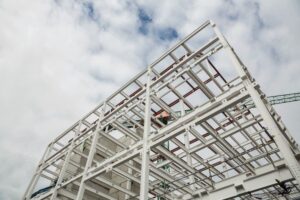
Top 5 Building Materials Used in the Construction of Factories and Industrial Structures
Constructing factories, manufacturing units, and other industrial structures demands the use of durable building materials that can endure the rigorous demands of heavy machinery, harsh environmental conditions, and stringent safety standards. These structures must not only provide a safe and secure environment for operations but also ensure longevity and efficiency in industrial processes. In this discussion, we delve into the top five essential materials used in industrial construction, emphasizing their unique properties, advantages, and versatile applications across various industrial settings.
Key Building Materials for Industrial Construction
Steel
Steel is an important material in industrial construction due to its strength, durability, and versatility. It forms the backbone of structures and is used for framing, beams, columns, and roofing. The high load-bearing capacity of steel, as a construction material, supports heavy machinery and equipment, and its fire resistance enhances safety in industrial settings.
Advantages of Steel:
– Strength and Durability: It is able to withstand heavy loads and harsh environments.
– Design Flexibility: It allows for efficient designs and large spans.
– Fire Resistance: It does not contribute to the spread of fire, ensuring safety.
Applications:
– Structural frameworks, roofing, machinery support, and safety features.
Concrete
Concrete offers properties such as strength, durability, and thermal mass properties, making it indispensable in industrial building construction. It is used for constructing foundations, floors, walls, and exterior surfaces of an industrial structure. Reinforced concrete or RCC, enhances structural integrity, supporting heavy industrial loads effectively.
Advantages of Concrete:
– Versatility: It can be moulded into various shapes and forms.
– Thermal Mass: It offers insulation and energy efficiency.
– Fire Resistance: Concrete is inherently fire-resistant.
Applications:
– Foundations, flooring, walls, and exterior surfaces.
Brick
Brick remains a traditional choice valued for its strength, durability, and aesthetic appeal in construction of industrial buildings. It offers thermal insulation and fire resistance, used for walls, partitions, and decorative elements.
Advantages of Brick:
– Thermal Insulation: Brick maintains stable indoor temperatures.
– Fire Resistance: It enhances safety measures.
– Aesthetic Versatility: They are available in various colours and textures.
Applications:
– Load-bearing walls, partitions, facade, and decorative elements.
Glass
Glass enhances industrial structures with transparency, natural light, and aesthetic appeal. It is used for windows, skylights, and facades, enhancing energy efficiency and occupant comfort.
Advantages of Glass:
– Natural Light: It reduces reliance on artificial lighting.
– Energy Efficiency: Glass improves thermal performance with advanced glazing.
– Aesthetic Appeal: It enhances modern architectural designs.
Applications:
– Windows, skylights, curtain walls, and interior partitions.
Composite Materials
Composite materials like fiberglass and carbon fibre provide high strength-to-weight ratios, corrosion resistance, and design flexibility. They are used in specialized structural components, reducing weight and improving durability.
Advantages of Composite Materials:
– Strength-to-Weight Ratio: It is lightweight yet strong.
– Corrosion Resistance: It is suitable for harsh environments.
– Design Flexibility: Composite materials mould into complex shapes.
Applications:
– Structural components, cladding, piping, and industrial equipment.
Wrapping Up
Steel, concrete, brick, glass, and composite materials are essential in constructing factories, manufacturing units and other industrial structures. Each material offers unique properties that meet the rigorous demands of industrial environments, ensuring safety, durability, and operational efficiency. As industrial architecture evolves with technological advancements, these set of materials continue to play crucial roles in shaping modern industrial buildings, such as factories, manufacturing units and warehouses, for enhanced performance and sustainability. By leveraging their strengths and embracing innovation, industrial construction remains at the forefront of architectural excellence and functionality.





